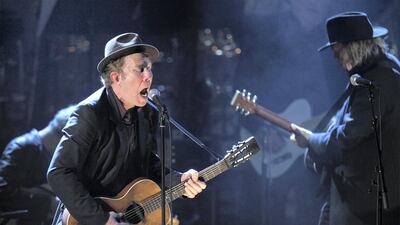Talking to Mojo back in 2004, Tom Waits was typically playful when discussing his unorthodox approach to music-making. "I break a lot of eggs," he quipped. "And I leave the shell in there. Texture is everything."
Perennially cool and gruff of voice, Waits, now 68, has done a fine job preserving his mystique. It helps that he's been fastidiously uncooperative with biographers – and always resisted the use of his music in advertisements.
Today sees Anti, the indie label Waits signed to at 50, release remasters of the first seven studio albums he made for Elektra Asylum Records between 1973 and 1980. Although Waits's reputation as a true maverick wasn't cemented until the release of his 1983 record Swordfishtrombones, his Asylum years are full of great songs.
Waits grew-up loving the sci-fi TV drama The Twilight Zone and the work of Beat writers such as Kerouac and Bukowski. Musically, he loved the rhythm and blues of Wilson Pickett, the balladry of Roy Orbison and much more besides, but it was the jazz great Thelonious Monk who inspired Waits to gravitate towards piano.
His songs could be seedy, romantic or blackly comic, and were typically peopled by freaks, outsiders and other characters down on their luck. As all-seeing narrator, Waits came to personify a kind of barfly musician. He painted a stunning portrait of tentative, last-orders romance in I Hope That I Don't Fall In Love With You (below), the stand-out from his 1973 debut Closing Time. Three years later, on 1976's Small Change, the character who sings The Piano Has Been Drinking (Not Me) is clearly playing for laughs: Waits hits bum notes deliberately, blaming them on his inebriated instrument.
It was on his second album, 1974's The Heart Of Saturday Night, that his beatnik and 1950s jazz leanings began to inform tracks such as Diamonds On My Windshield, a spoken-word piece Waits had read at the Venice Poetry Workshop in Los Angeles. His 1975 follow-up Nighthawks At The Diner was recorded live in front of a small audience, but the venue Waits refers to as "Raphael's Silver Cloud Lounge" was actually The Record Plant recording studio in Sausalito, California. It's an entertaining window onto his early, anecdote-rich live act all the same, Waits playing Mendelssohn's Wedding March on the piano in his introduction to Better Off Without A Wife. (By 1980, Waits had married film-script analyst Kathleen Brennan, who became his songwriting partner).
Eventually acting in movies such as Francis Ford Coppola's Rumble Fish and Robert Altman's Short Cuts, Waits also had a keen interest in film soundtracks, and this influence made itself known on both 1977's Foreign Affairs and Waits's 1978 mid-period masterpiece, Blue Valentine.
Here, Waits covers Bernstein and Sondheim's Somewhere from West Side Story. But in stark contrast to the song's heart-tugging string arrangement, his vocal is deliciously low and gruff. Kentucky Avenue is another highlight, its moving evocation of childhood peppered with stark images. "Mrs Storm will stab you with a steak knife if you step on her lawn", sings Waits, perfectly capturing the junior imagination ran wild.
_________________
Read more:
Is there a future for the live album?
Elton John calls it a day after 50 years on the road
Making sense of the Rock & Roll Hall of Fame
_________________
His last album for Elektra Asylum was Heartattack And Vine (1980), a transitional record that flits between gnarly R&B and strings-ornamented piano balladry. Waits says goodbye to Rickie Lee Jones on Ruby's Arms, a track Australian group Frente! called "the saddest song ever written" when they covered it in 1995.
All of Tom Waits’ first seven studio albums are re-released by Anti Records on March 9

